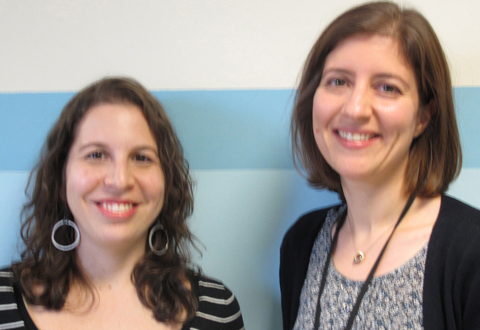Attention A T users. To access the menus on this page please perform the following steps.
1. Please switch auto forms mode to off.
2. Hit enter to expand a main menu option (Health, Benefits, etc).
3. To enter and activate the submenu links, hit the down arrow.
You will now be able to tab or arrow up or down through the submenu options to access/activate the submenu links.
Locator
Contact
Search
Safe Place to Discuss Fears

Dr. Veronica Ades and Dr. Joanna Dognin of VA New York Harbor Healthcare System.
Tuesday, February 3, 2015
“Women with a history of sexual violence are particularly vulnerable to reproductive health concerns, often due to anxiety and fear of gynecological and breast exams,” says Dr. Veronica Ades, a gynecologist with expertise in treating women with prior sexual trauma. Understanding and easing these fears is at the center of a new project led by Dr. Ades and Dr. Joanna Dognin, psychologist and Health Behavior Coordinator.
The project, funded by the Office of Women’s Health Services, will begin with focus groups to better understand barriers to reproductive healthcare, such as pap exams, contraceptive care and mammograms. Based on what is learned, Drs. Ades, Dognin and an interdisciplinary team of medicine, psychology, women’s health, and military sexual trauma experts will devise a series of Group Educational sessions to educate, answer questions and allow for open and safe dialogue for women Veterans whose trauma histories often prevent them from accessing care.
Each session will incorporate tactile models of reproductive organs as well as images of contraceptive interventions to acclimate women to medical exams, educate them about necessity of preventive care, answer questions, and elicit a safe space for women to discuss their fears and concerns about these medical exams.
“Our past preventive care initiative with women Veterans showed us both how much trauma complicates the relationships women Veterans have their healthcare teams,” says Dr. Dognin, “and how important the group environment is as a place to access and share healthcare information in a supportive, informative and a healing forum. We are hoping to build off this to specifically help with women Veterans with sexual trauma backgrounds.”
















